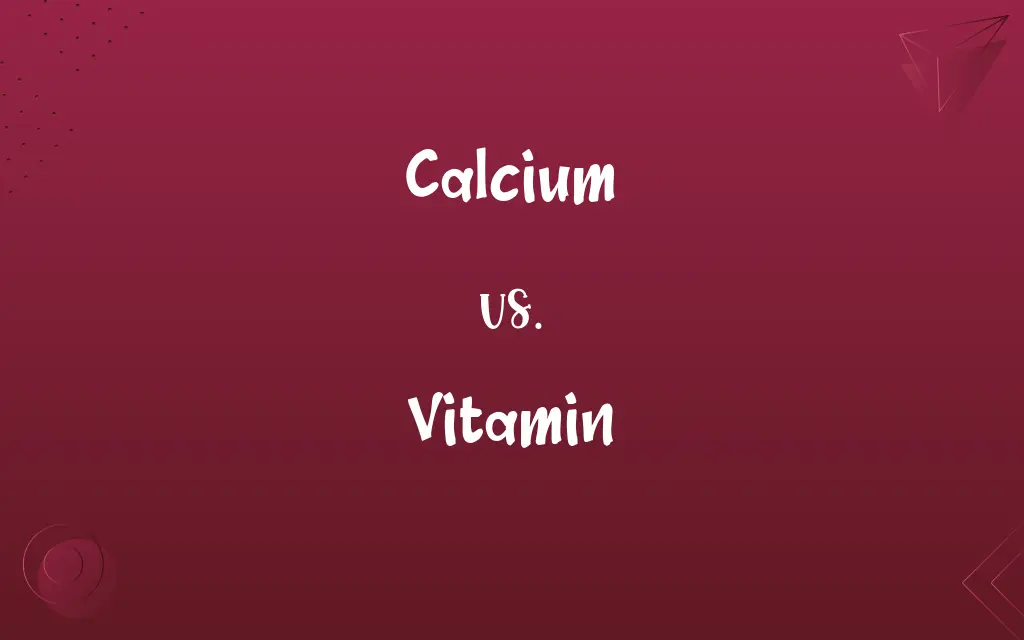Calcium vs. Vitamin: Know the Difference

By Shumaila Saeed || Updated on December 25, 2023
Calcium is a mineral essential for bone health, while vitamins are organic compounds vital for various body functions.

Key Differences
Calcium is a chemical element, symbolized as Ca, and is crucial for building and maintaining strong bones and teeth. In contrast, vitamins are a group of organic substances that are essential in small quantities for various metabolic processes. Both are vital but function differently in the body.
Shumaila Saeed
Nov 15, 2023
The body requires calcium for muscle function, nerve transmission, and vascular contraction. Vitamins, however, are needed for energy production, immune function, and blood clotting, among other roles. Both calcium and vitamins must be obtained through diet or supplements, as the body cannot produce them.
Shumaila Saeed
Nov 15, 2023
Calcium is found in dairy products, leafy greens, and fortified foods, and its deficiency can lead to osteoporosis. Vitamins are found in diverse food sources, with different types necessary for different bodily functions. Both deficiencies can have significant health impacts.
Shumaila Saeed
Nov 15, 2023
Excess calcium can cause kidney stones, while excessive intake of certain vitamins can lead to toxicity. Both require balanced intake for optimal health benefits.
Shumaila Saeed
Nov 15, 2023
The recommended daily intake of calcium varies by age and gender, while vitamin requirements vary based on the specific vitamin and individual needs. Both are integral to a well-rounded, nutritious diet.
Shumaila Saeed
Nov 15, 2023
ADVERTISEMENT
Comparison Chart
Primary Function
Bone and teeth health, muscle function
Various metabolic processes
Shumaila Saeed
Nov 15, 2023
Deficiency Diseases
Osteoporosis, rickets
Scurvy (Vitamin C), beriberi (Vitamin B1)
Shumaila Saeed
Nov 15, 2023
Sources
Dairy, leafy greens, fortified foods
Varied food sources, sunlight (Vitamin D)
Shumaila Saeed
Nov 15, 2023
Toxicity Symptoms
Kidney stones, cardiovascular issues
Nerve damage, liver damage (depending on vitamin)
Shumaila Saeed
Nov 15, 2023
ADVERTISEMENT
Calcium and Vitamin Definitions
Calcium
Calcium ions are important for transmitting signals in the nervous system.
The calcium in our body helps in sending nerve signals efficiently.
Shumaila Saeed
Nov 15, 2023
Vitamin
Vitamins support immune system function and cell growth.
Vitamin C supplements are popular for boosting immune health.
Shumaila Saeed
Nov 15, 2023
Calcium
Calcium contributes to the hardness and structure of teeth and bones.
A diet high in calcium can prevent tooth decay and gum disease.
Shumaila Saeed
Nov 15, 2023
Vitamin
Vitamins are organic compounds essential for growth and nutrition.
Eating a variety of fruits and vegetables ensures you get enough vitamins.
Shumaila Saeed
Nov 15, 2023
Calcium
Calcium is a chemical element vital for maintaining bone strength.
Milk is a great source of calcium, essential for healthy bones.
Shumaila Saeed
Nov 15, 2023
ADVERTISEMENT
Vitamin
Each vitamin has unique roles, like Vitamin D for bone health and Vitamin A for vision.
Carrots, rich in Vitamin A, are excellent for maintaining good eyesight.
Shumaila Saeed
Nov 15, 2023
Calcium
Calcium plays a critical role in blood clotting and muscle function.
To aid muscle recovery, athletes often include calcium-rich foods in their diet.
Shumaila Saeed
Nov 15, 2023
Vitamin
Vitamins are classified by their solubility, either water-soluble or fat-soluble.
Vitamin B12, a water-soluble vitamin, is vital for red blood cell formation.
Shumaila Saeed
Nov 15, 2023
Calcium
As an alkaline earth metal, calcium is a reactive substance found in limestone and gypsum.
Calcium deposits are often found in caves, forming stalactites and stalagmites.
Shumaila Saeed
Nov 15, 2023
Vitamin
Some vitamins, like Vitamin D, can be synthesized by the body under certain conditions.
Sun exposure enables our skin to produce Vitamin D naturally.
Shumaila Saeed
Nov 15, 2023
Calcium
A silvery, moderately hard alkaline-earth metal that constitutes approximately 3.6 percent of the earth's crust and is a basic component of most animals and plants. It occurs naturally in limestone, gypsum, and fluorite, and its compounds are used to make plaster, quicklime, Portland cement, and metallurgic and electronic materials. Atomic number 20; atomic weight 40.08; melting point 842°C; boiling point 1,484°C; specific gravity 1.54; valence 2. See Periodic Table.
Shumaila Saeed
Oct 19, 2023
Vitamin
Any of various fat-soluble or water-soluble organic substances that are essential in minute amounts for normal growth and activity of living organisms. They are synthesized by bacteria and plants and are obtained by animals chiefly in their diet.
Shumaila Saeed
Oct 19, 2023
Calcium
The chemical element (Symbol Ca), with an atomic number 20. It is a soft, silvery-white alkaline earth metal which occurs naturally as carbonate in limestone and as silicate in many rocks.
Shumaila Saeed
Oct 19, 2023
Vitamin
A preparation containing one or more vitamins, often taken as a dietary supplement.
Shumaila Saeed
Oct 19, 2023
Vitamin
Any of a specific group of organic compounds essential in small quantities for healthy human growth, metabolism, development, and body function; found in minute amounts in plant and animal foods or sometimes produced synthetically; deficiencies of specific vitamins produce specific disorders.
A food rich in vitamins
Shumaila Saeed
Oct 19, 2023
Calcium
An elementary substance; a metal which combined with oxygen forms lime. It is of a pale yellow color, tenacious, and malleable. It is a member of the alkaline earth group of elements. Atomic weight 40. Symbol Ca.
Shumaila Saeed
Oct 19, 2023
Vitamin
Any of several organic chemical substances not synthesized by an animal and required in small quantities for normal metabolism, present in and obtained from the natural foods eaten by the animal. Human vitamins are also produced synthetically, and taken in pure form or in mixtures, as dietary supplements. Deficiencies of specific vitamins lead to certain specific disorders, such as scurvy, caused by an insufficiency of vitamin C (ascorbic acid).
Shumaila Saeed
Oct 19, 2023
Calcium
A white metallic element that burns with a brilliant light; the fifth most abundant element in the earth's crust; an important component of most plants and animals
Shumaila Saeed
Oct 19, 2023
Vitamin
Any of a group of organic substances essential in small quantities to normal metabolism
Shumaila Saeed
Oct 19, 2023
Repeatedly Asked Queries
What's the main function of calcium?
To strengthen bones and teeth, and aid in muscle contraction.
Shumaila Saeed
Nov 15, 2023
Can you overdose on calcium?
Yes, excessive calcium can lead to kidney stones and other health issues.
Shumaila Saeed
Nov 15, 2023
Can calcium deficiency be dangerous?
Yes, it can lead to osteoporosis and other bone diseases.
Shumaila Saeed
Nov 15, 2023
Are vitamins synthesized in the body?
Some, like Vitamin D, can be synthesized; others must be ingested.
Shumaila Saeed
Nov 15, 2023
What vitamin is essential for vision?
Vitamin A is crucial for good eyesight.
Shumaila Saeed
Nov 15, 2023
What are vitamins?
Organic compounds necessary for various bodily functions.
Shumaila Saeed
Nov 15, 2023
Is calcium good for the heart?
In balanced amounts, yes, but excess can be harmful.
Shumaila Saeed
Nov 15, 2023
What is a water-soluble vitamin?
Vitamins that dissolve in water, like Vitamin C and B-complex.
Shumaila Saeed
Nov 15, 2023
What foods are high in calcium?
Dairy products, leafy greens, and fortified foods.
Shumaila Saeed
Nov 15, 2023
How does Vitamin D affect calcium?
Vitamin D aids in calcium absorption in the body.
Shumaila Saeed
Nov 15, 2023
Can calcium impact blood pressure?
Yes, it plays a role in maintaining normal blood pressure.
Shumaila Saeed
Nov 15, 2023
Why are vitamins important?
They are crucial for metabolic processes, immune function, and overall health.
Shumaila Saeed
Nov 15, 2023
Can vitamins be stored in the body?
Fat-soluble vitamins can be stored, but water-soluble ones cannot.
Shumaila Saeed
Nov 15, 2023
What is the role of calcium in blood clotting?
It helps in the formation of blood clots.
Shumaila Saeed
Nov 15, 2023
How much calcium do adults need daily?
It varies, but generally around 1,000 mg per day.
Shumaila Saeed
Nov 15, 2023
Can kids have the same calcium intake as adults?
No, children's calcium needs vary with age and growth stages.
Shumaila Saeed
Nov 15, 2023
What vitamin helps with energy production?
B-complex vitamins are vital for energy metabolism.
Shumaila Saeed
Nov 15, 2023
Is Vitamin C helpful in colds?
It can boost the immune system but is not a cure for colds.
Shumaila Saeed
Nov 15, 2023
Are there plant-based sources of vitamins?
Yes, many plants and vegetables are rich in various vitamins.
Shumaila Saeed
Nov 15, 2023
Share this page
Link for your blog / website
HTML
Link to share via messenger
About Author
Written by
Shumaila SaeedShumaila Saeed, an expert content creator with 6 years of experience, specializes in distilling complex topics into easily digestible comparisons, shining a light on the nuances that both inform and educate readers with clarity and accuracy.








































































